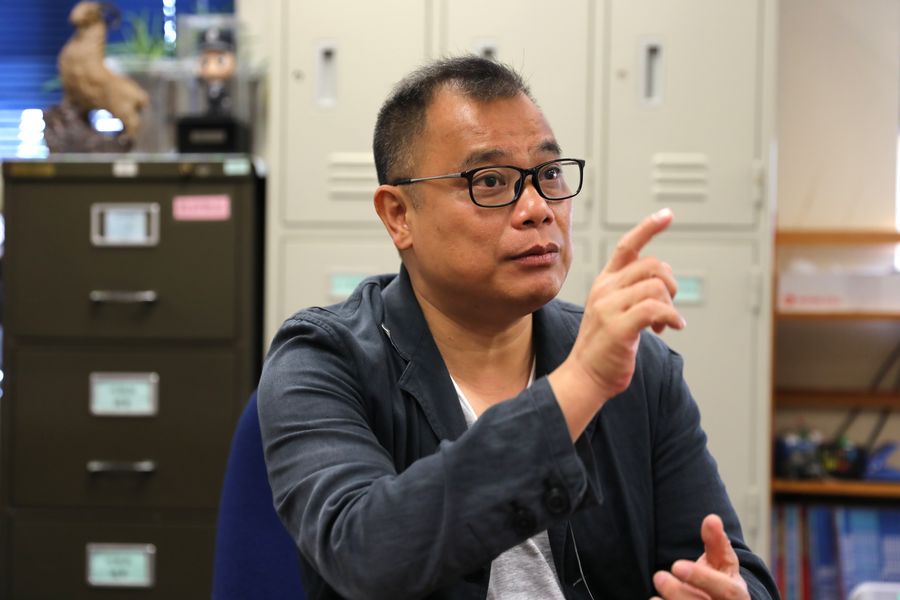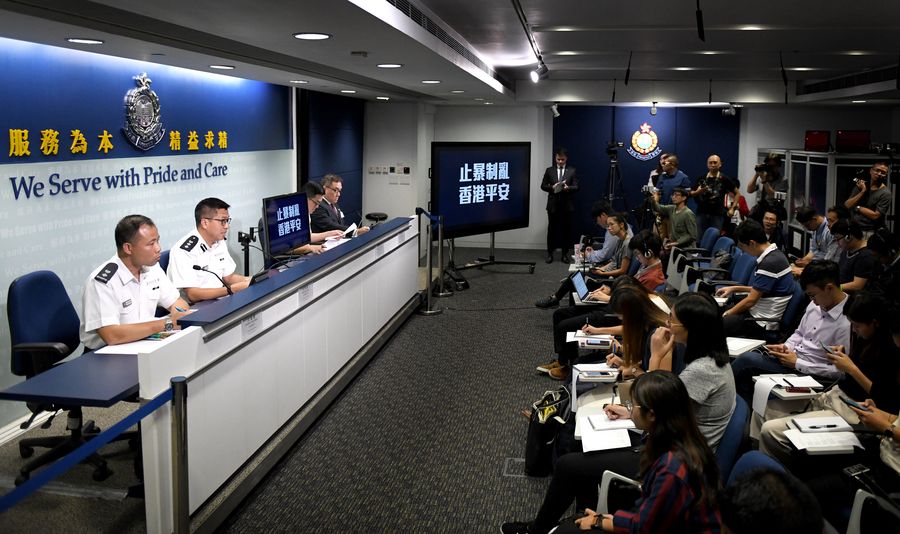
Lam Chi-wai, chairman of the Junior Police Officers' Association of the Hong Kong Police Force, speaks to Xinhua during an interview on Oct. 23, 2019 in Hong Kong, south China. (Xinhua)
Over the past four months, hundreds of police officers have been wounded in their law enforcement operations. During their treatment, some police officers have been given the cold shoulder by a few unprofessional medical staff, who brought their personal political views to work.
"The police officers were sent to hospitals for treatment on injuries they sustained on duty, but they were treated unprofessionally, and were humiliated, how would they feel?" asked Lam.
HONG KONG, Oct. 25 (Xinhua) -- Bearing the brunt of rioters' attacks, smears, and even threats against their families, Hong Kong police officers are facing huge pressure amid the months-long violence. To make things worse, some police officers have also received unfair and unprofessional medical treatment, which leaves them mental scars.
"From day one as an officer, the Hong Kong police have undertaken a mission: to do everything possible to maintain social stability and protect public safety," said Lam Chi-wai, chairman of the Junior Police Officers' Association of the Hong Kong Police Force, adding that despite occasional unfair treatment, the Hong Kong police always exercise a high level of restraint and endeavor to restore public order and safeguard the public.
Over the past four months, hundreds of police officers have been wounded in their law enforcement operations. As of last week, six officers were still hospitalized.
"It is comforting to note that the officers are in serious but non-life-threatening condition and that their recovery process has been relatively smooth," Lam said.
However, during their treatment, some police officers have been given the cold shoulder by a few unprofessional medical staff, who brought their personal political views to work.
According to Lam, a doctor gave a police officer, who was hospitalized after a rioter broke off his finger, only two days of sick leave. The doctor later explained irresponsibly that he "wrote the wrong number of days" in the diagnosis.
There were also police officers who were attacked and hospitalized with serious injuries, but were transferred to the general ward and asked to be discharged the next day, Lam said, adding that some hospitals even put up insulting political slogans.
During their official duties in hospitals, some police officers were also mistreated by medical staff.
A police district commander has issued a notice saying that some police officers were unreasonably shouted at while guarding suspects at hospitals, and some other police officers were prohibited from using chairs by medical staff.
Knowing that one of those arrested had an infectious disease, the medical staff failed to inform the guarding police officer, thus preventing him from timely self-protection, the notice added.
"The police officers were sent to hospitals for treatment on injuries they sustained on duty, but they were treated unprofessionally, and were humiliated, how would they feel?" Lam asked.

Hong Kong Police holds a press conference on Oct. 18, 2019 in Hong Kong, south China. (Xinhua)
Another concern for the police officers is that when seeing a doctor, they need to fill in a form about their personal information. In order to reduce unnecessary harassment and trouble for the police officers, a special meeting was held with the Hospital Authority to suggest that the form should be modified to only retain "profession" and remove "department," Lam said.
The Hospital Authority promised to amend the form, but several months later, the form contents remained unchanged.
"Did front-line staff not cooperate? Or did the management not do its job well?" Lam asked.
"It is fair to say that the majority of the Hospital Authority's management, senior health care staff, doctors and nurses have a professional attitude and care for police officers," Lam said, adding that, however, a few front-line medical workers have taken their personal political stance to their work, affecting the medical treatment process of injured police officers.
Even so, Lam said, these police officers returned to work immediately after recovery and continued to protect public safety.
"Though there is a difficult path ahead, I believe the police force would overcome the difficulties and continue to maintain social stability and protect Hong Kong people," Lam said. ■



